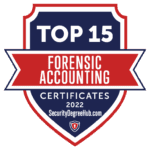Graduate Program Certificate:
Forensic Accounting
This specialization provides the core knowledge of and exposure to issues related to accounting fraud and helps students better understand and develop the necessary skills to effectively participate in a world of business that is increasingly aware of and protective against criminal activities. Application of tools and procedures to detect and correct accounting fraud is a major part of this Certificate.
Courses, such as Commercial Business Law, Financial Statement Analysis, and Accounting Information Systems, offer practical insight into security analysis, substantial data analytics, fraud detection, and much more. Investigating data manipulation and performing computer forensics are increasingly in demand and companies are seeking accountants in this area.
Forensic accounting professionals can be employed in a wide a variety of settings, including in public and private companies, law firms, government agencies, and more.
Career in Forensic Accounting
$82,000 +
Forensic Accountant Average SalarySource: Indeed (2025)
Required Courses
The certificate has the following prerequisite undergraduate courses, with a B or better, for admission:
52:010:101 Introduction to Financial Accounting
52:010:305 Intermediate Accounting I
52:010:415 Concepts of Auditing
Alternatively, students may take the non-credit Financial Accounting (53:010:505) and/or the Auditing (53:010:507) Knowledge Seminars, depending on prior coursework. There may be several additional prerequisite courses, depending on the student’s choice of electives.
This course covers theory of the attest function and advanced practical applications with attention to methods and procedures for evidence gathering, evaluation, and reporting. Philosophy, statistical sampling, EDP auditing, fraud examination, professional ethics, and audit research cases are emphasized.
Prerequisites:
52:010:305 Intermediate Accounting I
52:010:415 Concepts of Auditing
Students without an Undergraduate Accounting degree will also be required to take the above courses in addition to the following undergraduate course and earn a B or better for admission to the Graduate Certificate:
52:010:101 Introduction to Financial Accounting
This course introduces the field of forensic accounting and the role it plays in both preventing fraud from occurring and discovering fraud after it has occurred. Forensic accounting is relevant to many opportunities in the field of accounting and fraud detection in the private sector, public accounting, and government. Topics include complex financial investigations, compliance and financial audits, money laundering, net worth analysis, the psychology of white collar crime, financial statement fraud, and more.
Add two of five approved electives from the curriculum list.
Alternative courses can be considered in certain circumstances. Permission of the Program Director or Associate Dean for Graduate Programs is required. Contact your graduate academic advisor for more information.
NOTE: To earn a certificate, the student must complete all required courses in the associated program in which they were admitted. A student cannot earn two or more grades of C (including C+) or a single grade of F on her or his record. An overall cumulative grade-point average of 2.75 is required for certificate completion.
Upcoming Info Sessions
No events are posted at this time.
More Information
For more information or guidance through the application process, contact our Graduate team at rsbc.grad@camden.rutgers.edu.

